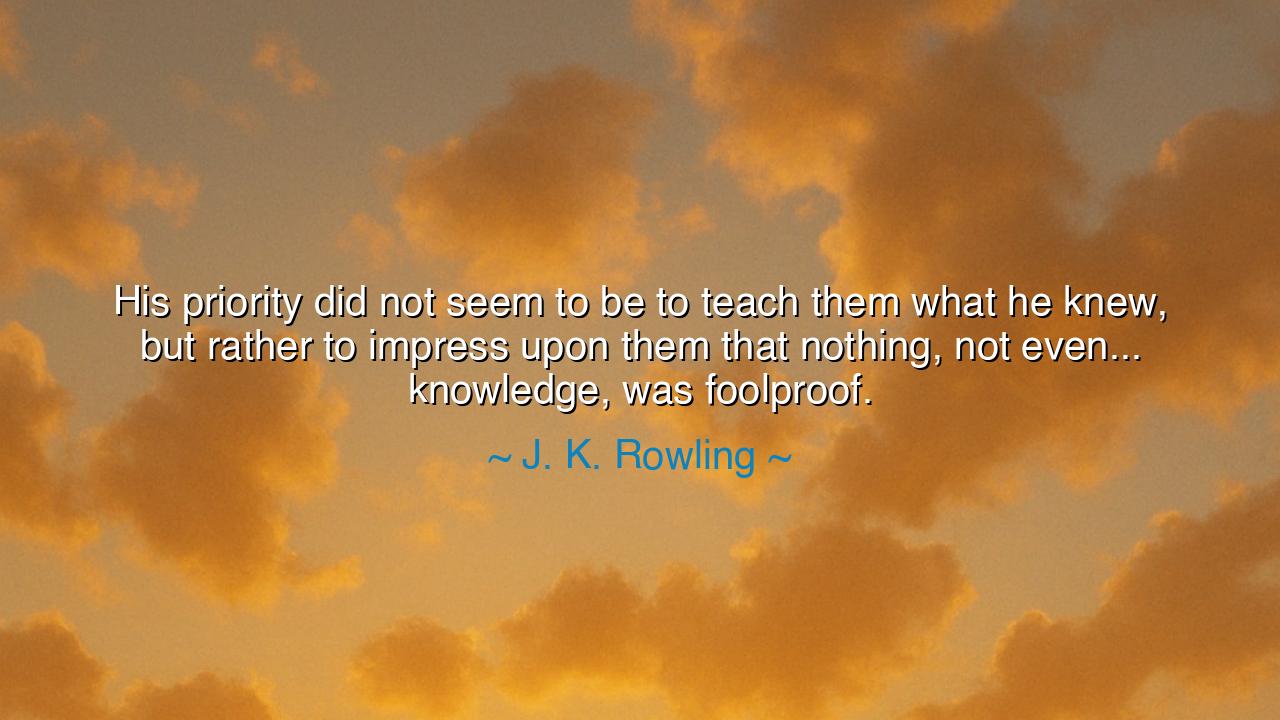
His priority did not seem to be to teach them what he knew, but
His priority did not seem to be to teach them what he knew, but rather to impress upon them that nothing, not even... knowledge, was foolproof.






Hear the words of J. K. Rowling, spoken through her tale but carrying the weight of eternal wisdom: “His priority did not seem to be to teach them what he knew, but rather to impress upon them that nothing, not even… knowledge, was foolproof.” In this sentence lies a truth as sharp as any sword—that wisdom is not the accumulation of facts, but the recognition of their limits. For even the brightest lantern cannot banish all shadows, and even the most learned mind must bow before mystery.
From the beginning, mankind has revered knowledge. It was the fire stolen by Prometheus, the fruit plucked from the ancient tree, the scrolls gathered in Alexandria. Yet the wise among the ancients knew that knowledge alone does not guarantee safety or virtue. The oracle at Delphi declared, “Know thyself,” not to glorify human learning, but to remind mortals of their own boundaries. Rowling’s words echo this lineage: that the true teacher is not the one who fills the mind with facts, but the one who shows the student that facts alone can fail.
Consider the story of the Titanic, that mighty ship proclaimed unsinkable, forged by engineers confident in their designs. Their knowledge was vast, their calculations precise, yet pride blinded them to the possibility of error. Ice tore the vessel open, and thousands perished in the cold sea. This tragedy stands as a monument to the danger of believing that human knowledge is foolproof. The lesson Rowling’s character imparts is the same: to know much is not to be invulnerable, for even wisdom can falter before the unexpected.
And yet, this is not a cry against learning. Rather, it is a call to humility. True teaching is not the transfer of certainty, but the shaping of character, the cultivation of minds that question, test, and prepare for uncertainty. The master who warns his students of the fallibility of knowledge arms them not with arrogance but with resilience. Such teaching is rarer than lectures, but far more enduring, for it prepares the soul not only to shine in times of ease but to endure in times of trial.
History gives us heroes who understood this balance. Think of Socrates, who declared himself wise only in knowing that he knew nothing. His greatness lay not in claiming mastery, but in guiding others to recognize the limits of their own certainty. Think of the scientists of later ages, who built upon this humility, always testing, always doubting, never assuming finality. In their restraint lay their progress, and in their caution lay their strength. Rowling’s words point us toward the same path: reverence for knowledge, but recognition of its fragility.
The teaching for us, O listener, is clear: pursue learning with passion, but hold it with humility. Do not worship what you know as if it were infallible. Do not trust blindly in formulas, systems, or traditions, for all may fail in the face of life’s storms. Instead, cultivate adaptability, self-awareness, and the courage to admit uncertainty. These virtues make knowledge not a brittle shield but a flexible tool.
Therefore, let Rowling’s words endure in your heart: knowledge is precious, but not perfect; powerful, but not absolute. The wise leader, the true teacher, the noble soul is not the one who pretends to know all, but the one who prepares others for the limits of knowing. Carry this lesson with you, and you shall not be broken when certainty crumbles, but shall rise, tempered and enduring, able to face the unknown with humility and strength.






AAdministratorAdministrator
Welcome, honored guests. Please leave a comment, we will respond soon